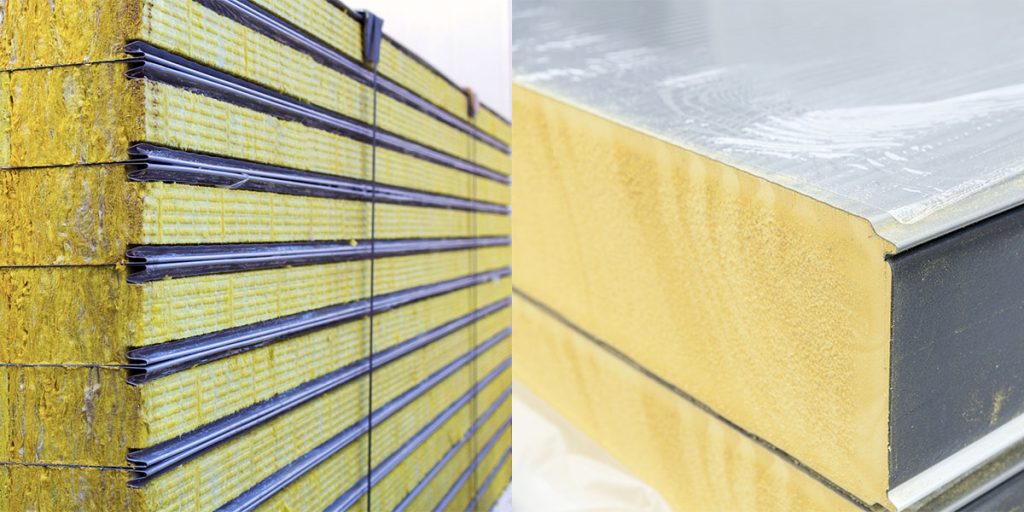THE DIFFERENCE BETWEEN PUR & ROCKWOOL INSULATED PANELS
In this blog post, you will find everything you should know about the difference between PUR and Rockwool insulated metal panels. Firstly, we will explain the difference in the insulating core of the panel. Secondly, we will dive into details and explain more carefully the different characteristics of PUR and Rockwool sandwich panels.
INSULATING CORE OF INSULATED METAL PANEL
The difference between polyurethane and rock wool insulated panels is in the insulating core of the panel.
The insulating core of a polyurethane panel is rigid polyurethane foam (PUR or PU). It is poured between the two metal supports during production. This foam, upon contact with the air, solidifies and glues the two plates together, creating a monolithic product with a very high insulating value.
Rigid polyurethane (PUR) insulation products are highly effective, and lightweight and many can bond to most materials. Its extremely low thermal conductivity and high strength-to-weight ratio, combined with excellent manufacturing versatility, provide a range of products. As a result, PUR insulation products are the natural choice for most construction insulation applications.
The insulating core of a Rockwool panel is rock wool, also called mineral wool. The Rock Wool is glued between the two sheets and forms a monolithic product.
Mineral wool is any fibrous material formed by spinning or drawing molten mineral or rock materials such as slag and ceramics. Applications of mineral wool include thermal insulation (as both structural insulation and pipe insulation, though it is not as fire-resistant as high-temperature insulation wool), filtration, soundproofing, and hydroponic growth medium.
WHAT ARE THE DIFFERENCES BETWEEN THESE TWO TYPES OF INSULATED PANELS:
- Insulation Value;
- Fire Behaviour;
- Sound isolation;
- The manipulation and installation are in place.
Let’s resume these differences in greater detail.
Insulation Value
The insulating value of polyurethane is higher than that of rock wool. What does it mean? This means that the same insulation thickness of the polyurethane isolates more. In other words, a 50 mm thick polyurethane panel insulates like an 80 mm thick rock wool panel.
Fire Behaviour
Polyurethane is an organic compound that images to a lesser or greater extent tends to fuel the flames. Rock Wool consists of inorganic elements, which therefore do not contribute to the spread of the flames. What does this mean? This means that where there is a need to have a product that guarantees a fire resistance of an hour or two hours or three hours, it is necessary to resort to a rock wool panel.
Here you can find a piece of insightful information about the difference between reaction and resistance to fire.
Sound Insulation
The core advantage of a Rock wool panel is a contribution in a superior way to the reduction of noise because the rock wool fibers break the acoustic waves and reduce their intensity.
Lastly, manipulation and installation are in place.
The main differences are related to the fact that the rock wool is heavier than polyurethane and therefore makes the handling and therefore requires more expertise for handling and installation of the panels.
CONTACT US
To learn more about the difference between polyurethane and rock wool insulated panels, you can get in touch at +44 7887 884768. You can also contact us via sales@globepanels.comor complete the contact form below. Once you reach out to us we can provide you with a free quote and can also discuss our products and services further.

 WhatsApp Us
WhatsApp Us